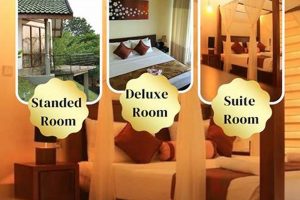Accommodations offering lodging for brief periods, typically less than a week, cater to a specific traveler demographic. These establishments often provide amenities geared toward convenience and efficiency, such as kitchenettes or business centers, depending on the target guest. For instance, a traveler needing a place to stay for a two-night business trip would likely find this type of lodging suitable.
This lodging option fills a crucial niche in the hospitality sector, offering flexibility and cost-effectiveness for those needing temporary housing. Historically, the demand for such accommodations arose with increasing business travel and the desire for more independent travel experiences than traditional hotels offered. This market segment plays a vital role in accommodating individuals relocating, attending training courses, or experiencing short getaways.
Further exploration of this topic will cover the diverse types of these establishments, their growing popularity, and the evolving trends shaping the future of short-term lodging.
Tips for Selecting Accommodations for Brief Stays
Choosing suitable lodging for short trips requires careful consideration of various factors. The following tips offer guidance for selecting accommodations that align with individual needs and preferences.
Tip 1: Location Matters: Proximity to key destinations, transportation hubs, or business districts should be a primary consideration. A central location can save valuable time and travel expenses.
Tip 2: Amenities and Services: Evaluate the available amenities. For business travelers, reliable Wi-Fi and business centers are crucial. Families might prioritize kitchenettes or laundry facilities.
Tip 3: Budget Considerations: Establish a budget beforehand and explore options within that range. Consider the overall value, including amenities and location, when comparing prices.
Tip 4: Read Reviews: Online reviews offer valuable insights from previous guests. Pay attention to comments regarding cleanliness, service, and overall experience.
Tip 5: Booking Flexibility: Look for flexible cancellation policies, especially when travel plans are subject to change. This can prevent unnecessary financial penalties.
Tip 6: Consider Transportation Options: Evaluate the availability of public transport, parking facilities, or airport shuttle services depending on individual needs.
Tip 7: Research Local Area: Investigate the surrounding neighborhood for restaurants, shops, and attractions that align with personal interests.
Careful planning ensures a comfortable and productive stay, maximizing the value of the chosen accommodations. Selecting the right lodging enhances both business trips and leisure travel.
By considering these tips, travelers can confidently select the ideal short-term accommodation, setting the stage for a successful and enjoyable experience.
1. Targeted Stays
The concept of “targeted stays” lies at the heart of the short-stay hotel model. These accommodations cater to specific demographics and travel purposes, optimizing their offerings to meet distinct needs. For example, accommodations designed for business travelers often prioritize convenient locations near commercial centers and offer amenities like workspaces and high-speed internet. Conversely, establishments targeting families might provide kitchenettes, laundry facilities, and nearby recreational opportunities. This specialized approach allows for a more efficient allocation of resources and a more tailored guest experience. The focus on specific needs differentiates short-stay hotels from traditional hotels, which often adopt a more generalized approach.
This targeted approach fosters efficiency and enhances guest satisfaction. By understanding the specific needs of their target demographic, short-stay hotels can optimize their services and amenities, resulting in a more streamlined and relevant experience. For instance, a short-stay hotel catering to medical tourists might offer transportation to nearby hospitals and provide information on local healthcare providers. This specialized approach not only enhances convenience but also builds trust and fosters loyalty within specific guest segments. The ability to cater to niche markets allows short-stay hotels to thrive in a competitive hospitality landscape.
Understanding the connection between targeted stays and short-stay hotels offers valuable insights for both providers and consumers. For providers, recognizing the importance of niche marketing and specialized services is crucial for attracting and retaining guests. For consumers, understanding these targeted offerings allows for more informed decision-making and a more tailored travel experience. This focused approach contributes to the continued growth and evolution of the short-stay hotel sector.
2. Flexible Bookings
Flexible booking options represent a cornerstone of the short-stay hotel model. This adaptability caters to the often unpredictable nature of short-term travel, where plans can change rapidly due to unforeseen circumstances. Changes in business meetings, flight delays, or personal emergencies can necessitate adjustments to accommodation arrangements. Short-stay hotels recognize this dynamic and offer flexible cancellation policies, date modifications, and even alterations to the length of stay with minimal penalties. For instance, a business traveler might need to extend their stay by a day due to a prolonged meeting, or a tourist might need to shorten their trip due to a family emergency. Flexible booking options accommodate these scenarios, reducing stress and financial burdens. This adaptability distinguishes short-stay hotels from traditional hotels, which often impose stricter booking conditions.
The practical significance of flexible bookings extends beyond mere convenience. This adaptability allows travelers to manage unforeseen circumstances efficiently. Consider a scenario where a flight is cancelled due to inclement weather. A traveler with a flexible booking at a short-stay hotel can easily modify their reservation to accommodate the delay, avoiding the added stress of securing last-minute accommodations or incurring penalties for a missed night. This flexibility also benefits the hotels themselves, allowing them to optimize occupancy rates by quickly re-booking rooms when cancellations occur. Flexible booking systems create a mutually beneficial relationship between guests and establishments, fostering trust and loyalty.
In summary, flexible bookings contribute significantly to the appeal and practicality of short-stay hotels. This adaptability addresses the inherent uncertainties of short-term travel, providing peace of mind and efficient solutions for unforeseen changes. The ability to adjust reservations easily enhances the overall travel experience, reducing stress and potentially saving costs. This flexibility remains a key differentiator within the hospitality industry, contributing to the growing popularity and success of the short-stay hotel model.
3. Amenity Variations
Amenity variations within short-stay hotels reflect the diverse needs and preferences of their target demographics. Understanding these variations is crucial for selecting accommodations that align with individual travel purposes and desired comfort levels. This exploration delves into key amenity facets, highlighting their impact on the short-stay experience.
- Essential Amenities:
Essential amenities form the foundational offerings in short-stay accommodations. These include comfortable bedding, ensuite bathrooms with toiletries, and reliable Wi-Fi access. While seemingly basic, the quality and availability of these essentials significantly influence guest satisfaction. For example, a business traveler relies heavily on consistent internet connectivity, while a leisure traveler might prioritize a comfortable bed for restful sleep. Variations in quality and accessibility within these essential amenities can differentiate one establishment from another, even within the same price range.
- Convenience-Focused Amenities:
Convenience-focused amenities cater to the efficiency-driven nature of short stays. These might include in-room kitchenettes for quick meal preparation, laundry facilities for maintaining fresh attire, or on-site fitness centers for maintaining routines. A traveler relocating for a short-term work assignment, for instance, would value a kitchenette for preparing meals, saving on restaurant expenses. The availability of these convenience-focused amenities often influences travelers’ choices, especially when seeking self-sufficiency and cost-effectiveness during their stay.
- Business-Oriented Amenities:
Business-oriented amenities cater specifically to the needs of corporate travelers. These often include dedicated workspaces within rooms, access to business centers with printing and copying facilities, and meeting rooms for conducting professional engagements. A consultant traveling for client meetings, for example, would benefit from these amenities, allowing them to maintain productivity while away from the office. The presence and quality of these business-oriented amenities can be a deciding factor for professionals when selecting accommodations.
- Leisure-Focused Amenities:
Leisure-focused amenities cater to the relaxation and enjoyment aspects of travel. These might include swimming pools, spas, or access to nearby recreational facilities. Families traveling for leisure, for instance, might prioritize establishments with swimming pools or easy access to amusement parks. The availability of these leisure-focused amenities can significantly enhance the enjoyment of a short trip, particularly for those seeking relaxation and entertainment.
These amenity variations demonstrate the adaptability of short-stay hotels in catering to diverse traveler profiles. The strategic selection and provision of amenities contribute significantly to guest satisfaction and influence booking decisions. By understanding these variations, travelers can make informed choices that align with their specific needs and preferences, ultimately enhancing their overall short-stay experience.
4. Cost-Effectiveness
Cost-effectiveness represents a significant advantage of short-stay hotels, particularly for budget-conscious travelers and those seeking value-driven accommodations. Understanding the factors contributing to this cost-effectiveness allows for informed decision-making and optimal resource allocation when planning short trips. The following facets explore key components of this financial advantage.
- Reduced Overall Expenses:
Short-stay rates are often structured to be more economical than extended stays in traditional hotels, especially for periods less than a week. This pricing model recognizes the shorter occupancy duration and adjusts costs accordingly. For example, a business traveler needing accommodation for two nights would likely find a short-stay option considerably cheaper than a week-long booking at a conventional hotel. This reduced overall expense allows travelers to allocate their budget towards other aspects of their trip, such as dining or entertainment.
- Amenity-Driven Savings:
The inclusion of amenities like kitchenettes and laundry facilities within short-stay accommodations contributes to cost savings. Guests can prepare their meals rather than relying on restaurants, and they can launder their clothes, reducing the need for expensive laundry services. For example, a family on a short vacation can significantly reduce dining expenses by utilizing an in-room kitchenette. These amenity-driven savings enhance the overall value proposition of short-stay accommodations, especially for longer short-term stays.
- Location-Based Value:
The strategic location of many short-stay hotels, often in proximity to city centers or transport hubs, contributes to cost-effectiveness. This proximity reduces transportation expenses and allows guests to access key destinations easily. For instance, a traveler attending a conference can save on taxi fares by choosing a short-stay hotel within walking distance of the venue. Location-based value enhances the overall cost-effectiveness of these accommodations, making them a practical choice for budget-minded travelers.
- Flexible Pricing Models:
Short-stay hotels often offer flexible pricing models that cater to different budgets and needs. These might include options for basic rooms with essential amenities or more premium options with enhanced features and services. This tiered pricing structure allows travelers to select accommodations that align with their financial constraints without compromising on necessary amenities. For instance, a student traveler might opt for a basic room with essential amenities, while a business executive might choose a more upscale option with a dedicated workspace and enhanced services.
These combined facets contribute to the cost-effectiveness that distinguishes short-stay hotels within the broader hospitality landscape. This financial advantage appeals to various traveler demographics, from budget-conscious individuals to business professionals seeking efficient resource allocation. By understanding the components contributing to this cost-effectiveness, travelers can make informed decisions that maximize value and enhance the overall travel experience.
5. Location Convenience
Location convenience forms a cornerstone of the short-stay hotel model, significantly influencing its appeal and practicality. The strategic placement of these establishments often prioritizes proximity to key destinations, maximizing efficiency and minimizing travel time for guests. This prioritization stems from an understanding of the time-sensitive nature of short stays, where guests often have limited time to navigate unfamiliar cities or regions. A short-stay hotel near a major conference center, for example, allows attendees to maximize their time at the event without lengthy commutes. Similarly, a location near a transportation hub, such as an airport or train station, simplifies travel logistics for guests arriving or departing on tight schedules. This emphasis on location convenience directly addresses the needs of short-term travelers, enhancing the overall experience and contributing to the sector’s growth.
The practical significance of this location-centric approach extends beyond mere convenience. It translates into tangible benefits for guests, including reduced transportation costs and increased access to local amenities. For instance, a centrally located short-stay hotel might allow guests to walk to restaurants, shops, and cultural attractions, eliminating the need for taxis or public transport. This not only saves money but also allows for a more immersive experience of the local environment. Furthermore, convenient locations can enhance business productivity by minimizing travel time between meetings or client engagements. A consultant working on a short-term project, for example, benefits significantly from accommodations near their client’s office, maximizing billable hours and minimizing unproductive travel time. These practical applications demonstrate the strategic importance of location convenience within the short-stay hotel model.
In summary, location convenience represents a critical factor in the success and appeal of short-stay hotels. This strategic focus addresses the specific needs of short-term travelers, offering tangible benefits in terms of time saved, cost reductions, and enhanced access to local resources. The continued emphasis on convenient locations reinforces the value proposition of short-stay accommodations within the dynamic and evolving hospitality landscape. This prioritization directly influences guest satisfaction, contributing to the sustained growth and popularity of the short-stay hotel sector.
Frequently Asked Questions
This section addresses common inquiries regarding accommodations for brief durations, providing clarity and practical insights for informed decision-making.
Question 1: What defines a “short stay”?
Duration definitions can vary, but generally, stays less than one week qualify. Some establishments might set specific limits, such as a maximum of five or seven nights.
Question 2: How do rates compare with traditional hotels?
Rates often prove more economical for shorter durations due to pricing structures designed for brief occupancies. Longer stays might negate this advantage.
Question 3: What amenities can one typically expect?
Essential amenities like Wi-Fi and ensuite bathrooms are standard. Establishments frequently offer kitchenettes, laundry facilities, or business centers, depending on their target demographic.
Question 4: What are the primary advantages of these accommodations?
Key advantages include cost-effectiveness for short trips, convenient locations, flexible booking options, and targeted amenities catering to specific needs.
Question 5: Are these accommodations suitable for families?
Suitability for families depends on the specific establishment. Some cater specifically to families with amenities like kitchenettes and extra bedding, while others focus on business travelers.
Question 6: How does one find reputable establishments?
Reputable establishments can be identified through online travel agencies, specialized booking platforms, or by researching local accommodation providers. Reviewing guest feedback provides valuable insights.
Understanding these key aspects facilitates informed decisions when selecting appropriate lodging for short trips.
For further information and specific inquiries, please consult individual establishment websites or contact their customer service representatives.
Short Stay Hotels
This exploration has provided a comprehensive overview of accommodations designed for brief periods. Key aspects discussed include the targeted nature of these establishments, catering to specific demographics such as business travelers or families; the flexibility offered through adaptable booking options; the variations in amenities, ranging from basic essentials to specialized features; the cost-effectiveness achieved through optimized pricing structures and amenity-driven savings; and the strategic importance of convenient locations, minimizing travel time and maximizing access to local resources. These combined factors contribute to the growing prominence of this lodging sector within the dynamic hospitality landscape.
The evolving demands of modern travel necessitate adaptable and efficient lodging solutions. Short-stay hotels address these demands, offering a practical and often cost-effective alternative to traditional accommodations. As travel patterns continue to evolve, the strategic advantages offered by these establishmentsflexibility, targeted services, and cost-efficiencyposition them for continued growth and relevance within the hospitality industry. Further research and analysis of emerging trends within this sector promise valuable insights for both travelers and industry professionals alike.







